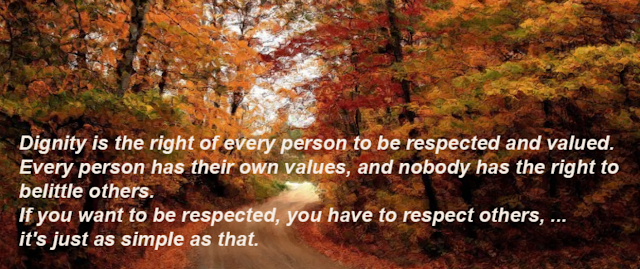Quality of Life and Dignity
My guiding principles:
You can only choose to a limited extent when you die and also only to a limited extent how you die.
But YOU can decide HOW you live. And that will tell you how you don't want to live.
Life and love can be so wonderful. Joy and pain can be that close And something new can always happen and you think you're in heaven. But if life has no more good moments, no surprises no quality for one and hope is only hope for hopes, you should be able to define how you can spend and enjoy the last few days and go with as little pain and suffering as possible.
Quality of life and dignity
The quality of life and the dignity of an individual person is a complex, unique, but as well changeable and adaptable in the course of a lifetime and in cases of changes and illness.
Dignity and quality of life, there are a number of definitions and considerations in various areas of society, in faiths, religions, in laws and also in philosophy, but no general definition.
Quality of life is defined by the World Health Organization as "an individual's perception of their position in life in the context of the culture and value systems in which they live and in relation to their goals, expectations, standards and concerns".
In medicine, it is seen as a multidimensional construct and measured using formal questionnaires - at this point a side note and comment from my side ... Who is seriously thinking like that? Who is seriously believing that a questionnaire can 'measure' a person's quality, dignity, self-esteem and self-reflection and not just because she or he has nothing else at hand? By the is a rhetorical question!
One's own dignity and one's own quality in life is really not easy to define, but easy to recognize. We see and feel it when it happens and when are we are lucky to experience it - but as well - we see it and feel it when we lose it.
Contradictions
Various inconsistencies, deviations and disproportions must inevitably occur - as dignity and quality of life are subjectively and uniquely inherent in every person - dignity and quality of life are built and determined by personal experience, expectations and one's own attitude and values. And so a third-party assessment of quality of life and the classification of satisfaction are -from my point of view - not possible or not comprehensible.
The overarching question is what constitutes quality of life for sick persons. This begs the question of what happens to a person in the face of a fateful and inevitable diagnosis - what is going on in this person, what does it means to the individual person - what does it means to the individual person being il? Is hope existing, is hope relevant, as well the question of acceptability and coping with life under these new and future circumstances.
This in turn raised the question of the incompatibility of objectively and subjectively experienced and felt qualities of life.
Acceptance of challenges and new situations in life
My personal experience is that the essential factors for every human being and especially for sick people are the livability of their OWN life, and not just existing - as well as coping with being ill, existing alongside and with their illness - in other words, it is the individual way of living one's life which is standing in focus.
Therefore the individual dignity and quality of life are characterizing how a person sees and want their life and it defines how and how deep it is significantly linked to the patient's life plans, personality and self-assessment - and that's why I think it is neither measurable nor comparable.
Quality of life should not be evaluated or treated on the basis of general aspects or other viewpoints - as abstract science-oriented medicine or psychology.
I don't want to dispute the necessity of such explorations for a doctor, especially when it comes to the comprehensibility and the request of medical assistance in dying - I can understand doctors very well - it's just not about an evaluation but rather about comprehensibility and coherence.
However, we should not lose sight of the fact that each of these aspects are made up of an individual her or his particular personality and their own concerns, values and logics.
Relationship between doctor and patient
We need better and closer talks betweens doctors and patients we have to work on sensitive relationship, by a more personal and 'unstructured' conversation - that will depend on both dialog partners - such an conversation should be less diagnostic driven, not only could the doctor find out something about the quality of life of his patient, but the patient could also learn and reflect their own situation, rethink their request for help - all of that will lead to a personal relationship - and might give the doctor the answer and arguments to show option, offer help and in worst case even being able and willing to offer medical assistance in dying.
It is all about humanity in and for life - a life worth living - but also about dying without unnecessary suffering and pain. It is about the people affected and not about relatives who do not perceive or not want to admit a loss.
Quotes
"Someone once told me that time was a predator that stalked us all our lives. I rather believe that time is a companion who goes with us on the journey and reminds us to cherish every moment, because it will never come again." Captain Jean Luc Picard in Star Trek: Generations
"If you die you're completely happy and your soul somewhere lives on. I'm not afraid of dying. Total peace after death, becoming someone else is the best hope I've got." Kurt Cobain
Death and Dying
There is nothing that most people fear more than death, or do they rather fear dying and the process and time of dying? What moves people at death's door ? You should talk about it, exchange ideas.
I believe it takes real courage to accept that everything we consider so important and integral to our lives will go and pass away.
Some of us will have the strength to overcome the fear of our mortality and bravely face this unknown journey.






If you like - Please send me your comment, or suggestion you may have.
ReplyDeleteI will not publish the comments. If you want a reply please don't forget to leave your contact information - Thx
Sie / Ihr könnt gerne Kommentieren - Kommentare werden nicht veröffentlicht!
Aber wenn Du / Ihr eine Antwort erwartet bitte hinterlasst auch eine Email-Adresse - Danke